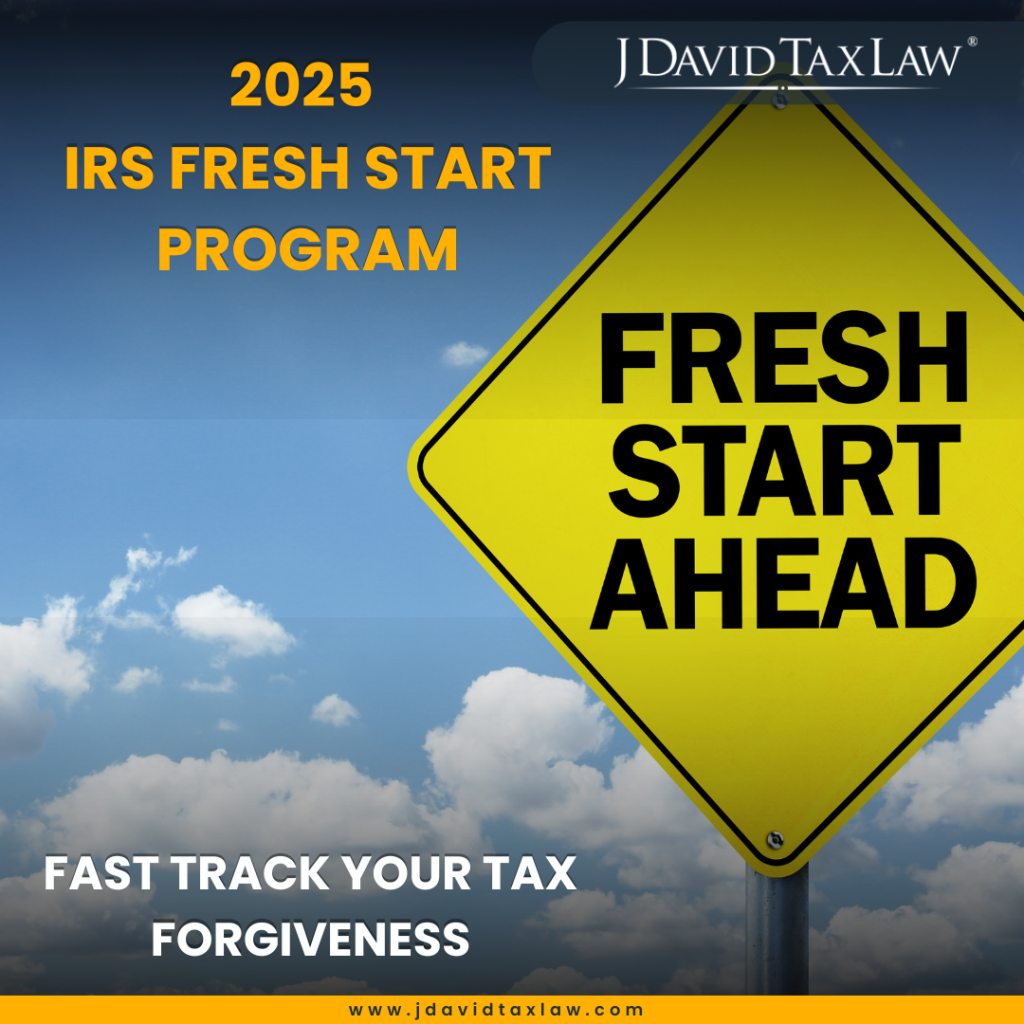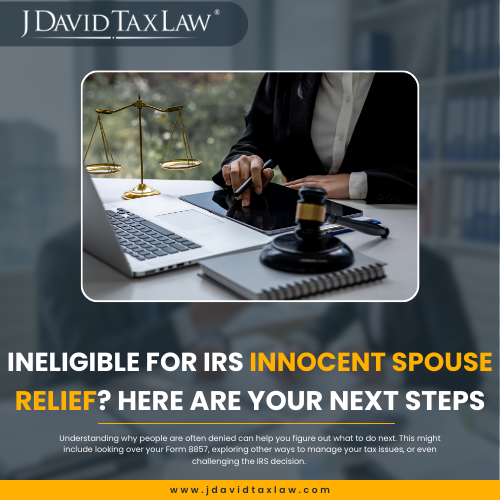When most people think of “tax problems,” they think of the Internal Revenue Service. But if you’re in California, tax debt troubles don’t end with the IRS. The Golden State has its own powerful tax agencies — the Franchise Tax Board (FTB), California Department of Tax and Fee Administration (CDTFA), and Employment Development Department (EDD) — and they can be just as relentless in chasing you down.
In fact, California’s high tax rates combined with notoriously aggressive enforcement and collection activities create a perfect storm for taxpayers. If you live or do business in Los Angeles, Irvine, San Diego, or anywhere in CA, you could find yourself facing state tax collectors who won’t stop until the debt is paid in full.
At J. David Tax Law , we don’t just resolve IRS issues. We defend Californians and California-based businesses from the state’s most relentless tax enforcement agencies. Our California tax attorneys understand the high stakes, fast timelines, and serious legal risks tied to state-level tax debt—and we’re ready to act quickly when the state tax agencies come after you.
IRS vs. California Tax Agencies: Key Differences in Enforcement
When it comes to collecting taxes, the Internal Revenue Service (IRS) writes the rules at the federal level. But California’s tax agencies have their own playbook, and it’s a tough one. Here are the major players and how they stack up against the IRS:
1. Franchise Tax Board (FTB)
The FTB is California’s version of the IRS for income taxes – it collects the state’s personal and corporate income taxes
Handles: California personal and corporate income taxes Risks: Liens, wage garnishments, driver’s license suspensions, 20-year collection window
How They Enforce
-
The FTB audits back four years instead of three (like the IRS), and in some cases, much longer especially if you don’t notify them of IRS audit changes.
-
They can act in as little as 90 days after a tax becomes delinquent.
-
They can intercept refunds, place liens on property , garnish wages, and suspend professional licenses or your driver’s license if you’re on the delinquency list.
-
They have twice the time the IRS does to collect— 20 years instead of 10 .
What to Do
Call us immediately! We stop wage garnishments, negotiate releases for property liens, and create legal buffers to prevent your license from being suspended. Our tax attorneys in California also handle residency disputes, audits, and re-opened cases triggered by IRS changes.
2. California Department of Tax and Fee Administration (CDTFA)
If you run a business in California, you’ll meet the CDTFA sooner or later. This agency administers California’s sales and use taxes (among other special taxes).
Handles: Sales tax, cannabis tax, fuel tax, use tax Risks: Business bank account seizures, permit revocation, criminal charges
How They Enforce
-
They view sales tax as “trust fund” money —so failure to pay can lead to felony charges .
-
CDTFA can revoke your seller’s permit , preventing you from legally operating your business.
-
They may estimate your sales if you don’t provide records and go after business owners personally.
-
Your name may appear on a public delinquency list , affecting your business reputation and licenses.
What to Do
If you’re facing a CDTFA audit, permit revocation, or sales tax assessment, consult an experienced California tax attorney immediately. Delays can lead to business shutdowns, frozen bank accounts, or criminal charges.
At J. David Tax Law , we defend business owners against aggressive CDTFA actions. Our attorneys are well-versed in California’s unique sales tax enforcement system, and we know how to challenge inflated assessments, reverse permit holds, and negotiate settlements. If needed, we represent clients before the Office of Tax Appeals (OTA) and handle state-level appeals from start to finish.
3. Employment Development Department (EDD)
The EDD is the state agency that collects payroll taxes and handles unemployment insurance taxes. If you have employees or even hire independent contractors, the EDD can audit you to ensure you’re paying all required payroll taxes
Handles: Payroll taxes, unemployment insurance, contractor classification Risks: Back taxes, penalties, criminal prosecution, reputation damage
How They Enforce
-
EDD audits often focus on whether you’ve misclassified employees as independent contractors.
-
If someone files for unemployment and you paid them via 1099, it triggers an audit flag .
-
They dig through 1099s, bank records, and payroll logs to uncover hidden liabilities.
-
Criminal referrals can happen in serious evasion cases.
What to Do
Start by gathering your payroll records, contractor agreements, and any correspondence from the EDD. Responding without proper documentation,or saying the wrong thing, can escalate your case quickly.
Retain a qualified tax lawyer with experience in California employment tax audits. These cases often involve nuanced misclassification issues and complex appeals procedures.
Our law firm defends businesses under EDD audit for payroll tax issues and contractor classification disputes. We know how to challenge audit overreach, protect against penalties, and represent clients before the Unemployment Insurance Appeals Board. In high-risk cases, we help clients avoid or defend against criminal prosecution referrals tied to payroll tax evasion.
Here’s why California’s tax enforcement feels more intense than federal enforcement:
|
Comparison Point |
IRS |
California Agencies (FTB, CDTFA, EDD) |
|
Audit Timeframe |
3 years |
4+ years, longer in special cases |
|
Debt Collection Window |
10 years |
20 years (FTB) |
|
Enforcement Style |
Structured, federal appeals |
Fast, administrative-level action |
|
License Revocations |
Passport only |
Driver’s + professional licenses |
|
Public Shame Lists |
None |
CDTFA/FTB Delinquency Lists |
|
Court Options |
U.S. Tax Court |
State OTA / UI Appeals Board |
California doesn’t just copy IRS rules, it picks and chooses what it wants to enforce. You can be audited even if you live in another state, just for having “nexus” like a business license or property in California.
State Tax Enforcement in California: Risks That Demand Immediate and Informed Action
California tax enforcement is not passive. The Franchise Tax Board (FTB), California Department of Tax and Fee Administration (CDTFA), and Employment Development Department (EDD) each have the authority to impose swift and far-reaching collection actions. These agencies operate under separate codes and procedures, which makes resolving state tax matters significantly more complex than negotiating with the IRS. Understanding the distinct legal risks is the first step toward protecting your income, your assets, and your reputation.
Liens That Restrict Ownership
California agencies impose tax liens as a powerful legal claim over your assets. These liens are not warnings. They are public records that attach to your property, cloud your title, and reduce your creditworthiness.
-
The FTB can file a lien after issuing required notices. In many cases, it acts faster than the IRS.
-
A recorded lien can prevent you from selling or refinancing property until the balance is paid in full.
-
High-balance taxpayers may be placed on the state’s published delinquency list. This exposure affects not only your personal reputation but also your eligibility for state licenses and contracts.
Once a lien is recorded, the path to resolution narrows. It is critical to respond promptly to notices and evaluate legal options to remove or limit the impact of the lien.
Levies That Remove Funds and Threaten Business Stability
A levy is a formal seizure of property or funds. In California, these actions often occur with minimal notice.
-
The FTB can issue an Order to Withhold to your bank , resulting in the immediate freeze and transfer of funds from your account.
-
The CDTFA may seize business assets or work with law enforcement to physically close a noncompliant location.
-
Levies may also apply to rental income , commissions, or payments owed to you by third parties.
-
Some levies remain in place until the full balance is satisfied , affecting ongoing income streams.
Receiving a levy notice requires immediate attention. It is essential to preserve financial records, assess exemptions under California law, and take swift legal steps to prevent continued or expanded enforcement.
Wage Garnishments That Erode Earnings
Wage garnishments in California follow a different structure than those imposed by federal authorities. Once initiated, these orders remain in place until the debt is fully collected or successfully contested.
-
The FTB and EDD may garnish a percentage of your wages , subject to exemption limits based on California’s income protection rules.
-
Employers are required by law to comply . You are not notified in advance beyond the state’s service of the garnishment order.
-
Garnishments continue over multiple pay periods and can severely disrupt your ability to meet basic financial obligations.
Responding before garnishment begins can preserve income. Submitting proof of hardship or negotiating alternative terms is often possible but only if action is taken before enforcement proceeds. We routinely secure full or partial garnishment releases within 48 hours. If your wages are already being garnished by the FTB or EDD, immediate legal action can help you recover lost income and prevent further financial disruption. We operate in all 50 states and maintain dedicated teams in California, including offices serving clients in Los Angeles , San Diego , and Irvine . Contact our office as soon as you receive notice or see garnishment activity on your paycheck.
Audits That Expand in Scope and Severity
California’s tax agencies conduct audits independently of the IRS. They also share audit findings with one another, increasing both the complexity and the financial exposure of your case.
-
The FTB conducts audits based on California’s definition of residency, income sourcing, and state-level deduction rules.
-
The CDTFA audits businesses for sales and use tax, applying industry-specific analysis to estimate underreported revenue.
-
The EDD reviews payroll filings and worker classifications, often reclassifying contractors as employees and retroactively imposing tax obligations.
These audits are invasive and highly technical. In many cases, errors uncovered during an audit can lead to additional penalties, interest, and even referral to other agencies. A methodical and legally informed response is essential to limit liability and avoid cross-agency enforcement.
Criminal Enforcement and Civil Judgments
In serious cases, California agencies may pursue criminal charges or convert tax debt into long-term civil judgments.
-
The CDTFA may refer cases involving unpaid sales tax for criminal prosecution under state theft statutes.
-
The EDD has the authority to pursue fraud claims in cases involving falsified payroll or misclassification of employees.
-
The FTB may convert expiring debts into court judgments, extending their enforceability for years beyond the original statute of limitations.
These escalations carry significant risk. Criminal charges may be filed even without prior civil resolution. Civil judgments can result in ongoing collection actions for decades. Once legal proceedings begin, your ability to negotiate favorable terms diminishes.
Why Other National Tax Firms Often Fail with California Tax Problems
With both the IRS and state agencies on the hunt, many Californians turn to national tax resolution companies or big-name firms that promise relief. Unfortunately, national tax firms often mishandle state tax cases, for several reasons:
-
IRS-Centric Focus
Most tax relief companies build their expertise on dealing with the IRS. They advertise help with “IRS tax debt” and train their staff on federal programs like IRS installment agreements or Offers in Compromise. When it comes to California’s FTB, CDTFA, or EDD, these companies frequently apply the same one-size-fits-all strategies , which can backfire.
For example, a firm might be great at filing an IRS Offer in Compromise, but California’s offer-in-compromise programs have different rules and much stricter acceptance criteria. We’ve seen cases where other big name national firms told a client an OIC would wipe out their state tax debt – only to have it swiftly rejected because the firm didn’t know the state’s nuances. Knowing this J. David Tax Law has opened multiple locations in California to help taxpayers not only overcome tax debt at a federal level but at a state level as well.
-
Lack of Local Knowledge and Access
Dealing with California tax agencies often means navigating bureaucracy in San Diego or local offices in Los Angeles, San Francisco, etc. National firms based out-of-state might not even have contacts at the California agencies or know how to reach the right personnel.California’s agencies often have dedicated collectors or settlement officers on a case – knowing how to get someone on the phone at the FTB’s L.A. office, or understanding the OTA hearing procedures in Orange County, is invaluable.
Unlike the IRS, which issues a 90-day letter before Tax Court, the FTB’s timeline to protest or appeal is shorter (60 days for an NPA protest, 30 days after a Notice of Action to go to OTA). A national firm unfamiliar with California’s procedures may unintentionally miss critical deadlines, putting your right to appeal at risk . And have you ever tried calling the FTB or CDTFA call center? It’s a headache even for seasoned pros. Without local insight, national firms often hit a wall.
-
One-Size-Fits-All vs. Customized Strategy
Every tax case is unique, especially at the state level. Yet some national companies use a cookie-cutter approach – they assign you a caseworker who follows a script. That might somewhat work for straightforward IRS payment plans, but it falls apart with complex state issues. For instance, an out-of-state advisor might not realize that simply setting up any installment agreement with the FTB won’t remove a lien (California might keep a lien in place until you pay in full, unlike the IRS which will release a lien after certain conditions). Or they may not know that the CDTFA often insists on a security deposit or bond for businesses with a history of non-payment – something that needs negotiation.
We’ve heard of national firms advising clients incorrectly on EDD audits – one client was told to “just supply whatever documents EDD asks for and wait,” which is a recipe for disaster. In reality, you need to proactively manage an EDD audit, often by providing context and legal arguments to prevent an overblown assessment.
J. David Tax Law: Local Tax Expertise You Can Trust
At J. David Tax Law, we are a team of experienced tax attorneys who handle cases across the United States and have dedicated expertise in California’s unique tax system . Here’s what sets us apart and why our clients trust us with their toughest state tax problems:
Take Control Before the State Does
California’s tax agencies are among the most aggressive in the country. Whether you are facing an audit, garnishment, levy, or unresolved debt from the FTB, CDTFA, or EDD, one thing is clear: waiting only makes it worse. These agencies move quickly, operate under their own rules , and are not bound by the same procedures as the IRS.
At J. David Tax Law, we don’t apply generic solutions to complex state problems. We apply California-specific legal strategy—built from experience, grounded in statute, and shaped by results. From Los Angeles to San Diego to the Bay Area, our team knows how to stop aggressive enforcement , negotiate directly with state officers, and resolve liabilities with precision.
If you are facing state tax issues, do not trust your future to guesswork, delay, or firms unfamiliar with California’s tax system. You need experienced attorneys who know how to navigate this state’s unique rules and how to protect what matters to you.
We are ready when you are. Call (888) 342-9436 or visit www.jdavidtaxlaw.com to speak with a California tax lawyer today.





















